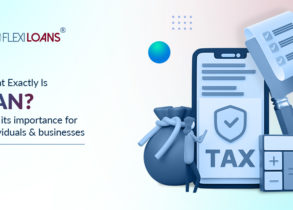May 27, 2022

Are you a retail business owner? Or someone who’s planning to do so? If yes, this article is for you!
Operating retail businesses can be a challenge, albeit with plenty of growth and scope for success.
As a retail business, you might need funding for a variety of purposes. From purchasing inventory to marketing and advertising spending, adequate working capital is the secret to growing your retail business in India.
Unfortunately, the business loan eligibility criteria for retail businesses involve multiple tax-related conditions from the banks. This way, many businesses are unable to secure the funds due to their past business performance. In that case, it is best to explore the other avenues available to you. This article covers the top 5 retail financing options for small business owners.
What are these options and how can they benefit you? Let’s find out.
- Personal Loans
Technology, manpower and finance are crucial components of any retail business. A good retail financing option, personal loans are used to sustain the business and invest in growing infrastructure.
It is an effective alternative to traditional business loans in India. Personal loans enable business owners to set up a corpus of funds to strengthen their operations, delivery and sales.
These are usually unsecured loans, and it makes sense if you’re investing the money to grow further.
You don’t need to put assets at risk, with highly-flexible loan tenures and repayment options. Interest rates for business loans in India are often a big hurdle for entrepreneurs.
- Business Line of Credit
A business line of credit is similar to credit cards, with a revolving type of loan. It allows the business owner access to a certain amount of money to meet the immediate requirements of the business. Contrary to traditional business loans, this retail financing option allows the borrowers to withdraw small amounts of money periodically. Borrowers will pay interest only on the amount they withdraw, rather than paying the entire corpus amount. They further balance it by repaying the amount being withdrawn. Borrowers need to furnish a minimum payment on a monthly basis, in order to avoid higher interest rates. Such types of loans are usually taken for a period of 10-15 years, and usually offer better repayment and withdrawal terms.
- MUDRA Loans
A new type of retail financing option, Mudra loans are a government credit scheme offered as part of the Pradhan Mantri Mudra Yojana (PMMY). Also known as the ‘Micro-Units Development and Refinance Agency’, it allows business owners to apply for SME business loans ranging from Rs. 50,000 and Rs. 10 lakhs. Available to all Indian citizens who are eligible for getting loans and have a business plan that generates ongoing income, the MUDRA loans are gaining a lot of popularity lately. Some common industries that are eligible for business loans under this scheme include shopkeepers, business vendors, small-scale manufacturers, and service-based businesses. The minimum eligibility criteria to avail of these loans is 18 years, whereas the maximum limit for the same is 65 years. You’ll need to furnish documents such as your ID and address proof, alongside passport-sized photos, to avail of this option.
- Equipment Financing
Equipment financing loans are financial instruments that help entrepreneurs purchase new equipment and machinery. You can even avail of equipment financing for upgrading existing machinery. This retail financing option is ideal for both SMEs and large-scale enterprises, apart from offering several tax-related benefits. While its utility is the same across all major businesses, factors such as interest rates, loan amount and tenure may differ. It usually depends on bank to bank, as to what kind of interest rates they charge. Most banks have set 21 years as the minimum age requirement for availing of equipment finance loans. These people should usually be running big corporates, partnership firms, and sole proprietorship firms. While it is not always a major criterion, some banks do ask for your ITR and other related documents to grant these bank loans.
- Angel investments
This is a common retail financing option that has been utilized by small businesses and start-ups for years now. It is one of the most popular ways to raise money for your business. Angel investors are individuals with a high amount of disposable income who want to invest in high-growth businesses and SMEs. Apart from returns on their investment, angel investors often look for companies that bring innovation to the table. So if you’re a retail business with an innovative product/service, angel funding is for you. The Indian angel investing landscape has grown exponentially in the last 5 years, with several investors jumping onto the bandwagon. Angel investors usually purchase a minority or majority stake in the company, alongside financing the business. They also usually get a share in profits for the same.
Bonus Retail Financing Option:
- Unsecured SMB loans
Unsecured SME loans are another retail financing alternative you can check out. If you wish to increase your bottom line and boost business, this is the way to go! It is a rather straightforward financing option and can be used for any activity related to your business.
Some of these include:
- Buying bulk inventory and equipment
- Stock refilling based on seasonal/peak demand
- Improving interiors, fixtures and adding bespoke signages in the store/outlet
- Spending on marketing and online advertising
- Hiring and scaling operations
- Paying electricity, water and other utility bills.
The application process for SMB loans is simple, and you can apply for them instantly. It, however, often has high repayment and interest rates.
Endnotes
So these were the top 5 retail financing options for you to explore. If you are a retail entrepreneur and want to grow your business further, do check out these options.
Flexible and easy, these financing options often come with the promise of maximizing profits and brand identity.







